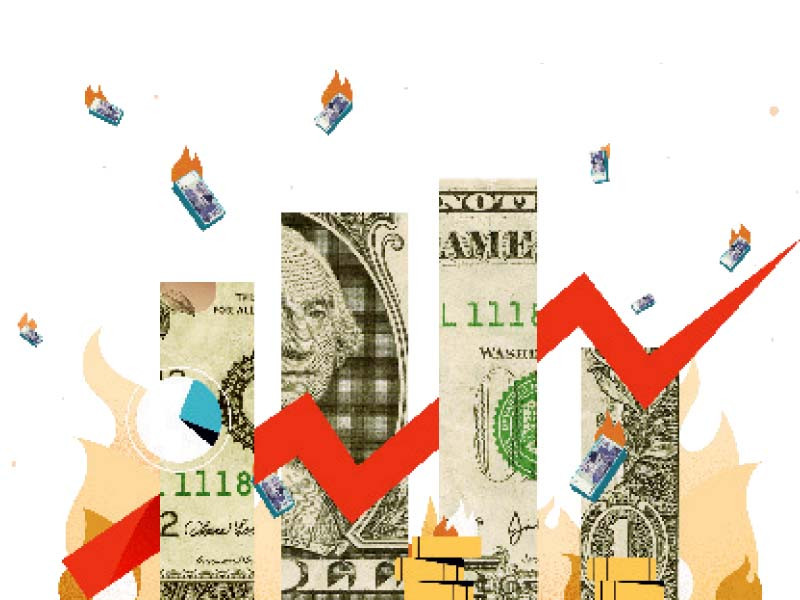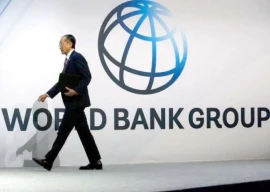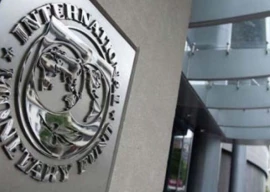
Fitch Solutions has projected Pakistan’s economic growth to contract by 0.3% in the current fiscal year 2023 after the government allowed the local currency to devalue by a net 14.2% against the US dollar in the past four working days. The rupee closed at Rs268/83 in the interbank market on Tuesday, in the backdrop of other actions by the government to revive the International Monetary Fund (IMF) loan programme.
The US-based global research house anticipated that the current cycle of rupee devaluation has not yet ended. The rupee will continue to lose its value against the US dollar, considering high demand for the foreign currency to pay for imports and repay colossal foreign debt.
Accordingly, the country’s economic challenges are going to multiply, going forward, it said.
“It (rupee devaluation) could exacerbate imported inflationary pressure and may eventually result in steeper policy rate hikes from the SBP (State Bank of Pakistan),” Fitch Solutions said in a report titled ‘Quick View: Pakistan Rupee Could Weaken Further’.
“These factors will only exacerbate Pakistan’s challenging economic outlook. We currently expect the economy to contract by 0.3% in FY 2022/23,” noted the report dated January 30, 2023.
To recall, Pakistan’s central bank said on January 23, 2023, that it had revised down its projection for economic growth to less than 2% for the current fiscal year 2023, as compared to around 2% for the year earlier.
This was its second downward revision. Prior to this, the SBP had estimated growth in the range of 3-4% before the widespread devastating floods hit the economy hard in August-September 2022.
At the outset of the year, the government had targeted growth of 5%, as compared to 6% achieved in the previous two consecutive fiscal years (FY21 and FY22).
“Curiously, the rupee’s devaluation will help Pakistan with securing further disbursements from the IMF, which would be a positive for the longer-term outlook as it would help ease Pakistan’s balance of payments strains,” said the report.
On Thursday, the government ended its control on the rupee-dollar exchange rate on the directives of the IMF to revive its stalled $7 billion loan programme.
Fitch noted that the “rupee’s devaluation was triggered by the decision among local foreign exchange companies to remove a self-imposed cap on the exchange rate on January 25. The SBP initially intervened but the significant depreciation in the rupee is a clear sign that the authorities have effectively loosened their grip on the currency.”
The global research house believes that the rupee will continue to devalue, particularly with Pakistan’s balance of payments position likely to remain weak for several more months.
“That being said, there remains a considerable amount of uncertainty at this juncture. For example, it is difficult to gauge the extent to which the latest devaluation has caused investor sentiment to further sour,” the report added.
Pak-Kuwait Investment Company (PKIC) Head of Research, Samiullah Tariq anticipated that the rupee would settle somewhere in the range of Rs265-275 in the short-run.
“Later on, it could keep depreciating by 5% a year (or almost half a percentage point each month, going forward) to adjust for inflation in the country and globally,” Tariq noted.
He further stated that the inflation reading has hit a five-decade high at 27.55% for January 2023, as per the latest government data released on Tuesday.
The inflation reading will continue to rise in the months to come and surpass the level of 30%, as the government is set to increase power and gas tariffs and take measures to collect additional revenue in taxes worth Rs200 billion on the condition of IMF.
Tariq, however, disagreed with Fitch Solutions over its forecast for “steeper policy rate hikes from the SBP”.
He projected that the central bank may increase the policy rate by a further 100 basis points to 18% and not more than that, considering that the latest rupee devaluation has minimised the requirement for larger rate-hikes.
Earlier, the central bank continued to increase its key policy rate by a cumulative 10 percentage points in the past 17-months (September 2021 to January 2023) to 17% at present. The move was taken to stem the tide of rising inflation.
If Pakistan successfully achieves staff level agreement during the ongoing IMF talks (January 31 to February 9), the IMF executive board will approve the release of the next tranche of $1.1 billion.
Topline Securities Director Research, Umair Naseer explained that a “further delay in the resumption of the IMF programme will trigger the looming default, as the country is left with only two to three-week import cover of $3.7 billion at present.”
The latest rupee devaluation has, however, increased the inflow of foreign currency on account of export earnings and workers’ remittances in the recent days. Exporters are also selling dollars on forward counters in the interbank market, market reports indicate.
Published in The Express Tribune, February 2nd, 2023.
Like Business on Facebook, follow @TribuneBiz on Twitter to stay informed and join in the conversation.




1731975305-0/Untitled-design-(40)1731975305-0-165x106.webp)
1731975060-0/Untitled-design-(39)1731975060-0-165x106.webp)




1730379446-0/WhatsApp-Image-2024-10-31-at-17-56-13-(1)1730379446-0-270x192.webp)










COMMENTS
Comments are moderated and generally will be posted if they are on-topic and not abusive.
For more information, please see our Comments FAQ